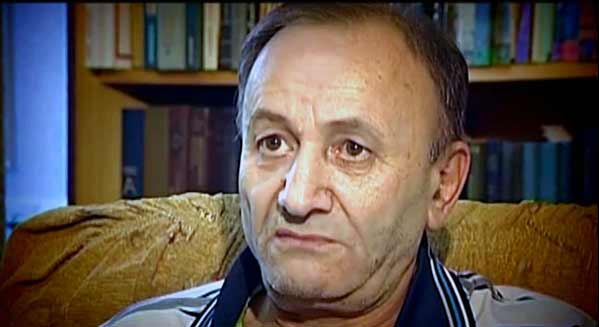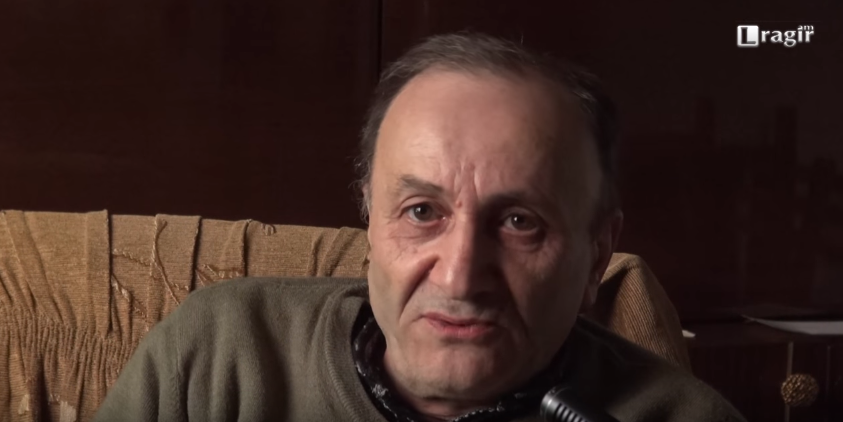The investigator conducting the preliminary investigation of the soldier’s murder case is not familiar with the Criminal Code

On July 31, 2013, at approximately 1:40 pm temporary soldier Manuchar Meruzhan Manucharyan’s body was found in the area of one of the RA MD military units. A criminal case was initiated which is carried out by M. Nalbandyan, Investigator at Investigative Department for Particularly Important Cases in the 4th Garrison Investigative Service of the RA MD.
The victim’s brother Onik Meruzhan Manucharyan who is acknowledged as the victim’s successor in the murder case applied to Peace Dialogue NGO. On February 17, 2014 he made a complaint regarding the process of the preliminary investigation, particularly against the decision made by the investigator of the case M. Nalbandyan.
Last year the victim’s brother challenged investigator M. Nalbandyan since from the very first day the latter recorded the murder committed by three gunshots as a suicide and carried out a biased investigation attempting to “substantiate” this fake and unsubstantiated hypothesis. The expertise did not find fingerprints on the victim’s weapon (in the incident location) which already proves that Manucharyan was murdered, and that the evidence was falsified (weapon was changed, fingerprints were cleaned)[1]. First, in order not to put the hypothesis of suicide under suspicion the MD Investigative Service spread false news that M. Manucharyan was a witness of Jehovah, that he was in love with a girl who refused him and that he committed suicide because of her refusal.
The challenge of the victim’s successor was refused.
The NGO specialist R. Martirosyan, getting acquainted with the above-mentioned decision, revealed that on February 17, 2014 investigator Nalbandyan made a decision about carrying out a postmortem forensic-psychological and forensic-psychiatric integrated expertise. In his decision the investigator confirmed the necessity of such an expertise and presented justifications: in fact, that decision is based on the testimonies of only one witness, Libik Edik Mkrtchyan.
According to the specialist, “Not only the investigator relies on the testimonies of only one witness when assigning an expertise, significant part of the testimonies is not clear and not proved by other witness testimonies”.
During the preliminary investigation temporary soldier of the same military unit Libik Edik Mkrtchyan testified that allegedly about 40 days before July 30, 2013 temporary soldiers of the same unit Sergeant Arman Stepanyan and Junior Sergeant Babken Gaboyan ‘… started making private Manuchar Manucharyan wash their clothes which they used to wear when leaving the unit of their own will’.
According to the witness, about 2 days before the incident (in the evening of July 29), after an order to sleep, A. Stepanyan told Manucharyan to wash his clothes but the latter refused him. Then the investigator writes. “Although M. Manucharyan did not wash A. Stepanyan’s clothes that day and went to bed, the latter kept on insisting him to wash his clothes and then went to the bed and started kicking M. Manucharyan for about 5 minutes. While hitting A. Stepanyan was asking M. Manucharyan if he would wash his clothes and the latter answered that he would not”.
Let us dwell on this episode. As a rule 25-40 soldiers sleep in the barracks of the company. Since the incident happened after the sleep order, it is logical that all the soldiers mentioned above must have been in the barracks at the time and witnessed the incident mentioned by Libik. However, according to the criminal case, what Libik told is not substantiated by the soldiers.
According to another episode told by Libik, in the evening of July 12, 2013 “…after the sleep order B. Gaboyan made Manucharyan take the roll-call records, go up to the second storey of the bed only in pants and do the roll-call out loud. Though M.Manucharyan asked B. Gaboyan not to do such a thing, the latter demanded from M.Manucharyan to do the roll-call…” M.Manucharyan “…could not read the surnames correctly and all the soldiers started laughing at him”.
The witness again tells about an incident which happened in front of the soldiers in the company barracks. Libik mentions that all the soldiers were allegedly laughing at M. Manucharyan. However, the soldiers mentioned both in Libik’s testimony and by the investigator are faceless and nameless; what Libik told is not confirmed by “all” the soldiers or at least some of them.
In his decision investigator M. Nalbandyan writes, “…on Sptember 27, 2013 B. Gaboyan was questioned as a suspect and only testified that he had never abused or beaten M. Manucharyan either with Arman Stepanyan or alone”.
The fact of violence and beatings is also substantiated by the same “sharp” Libik’s testimonies: according to him, on the day of the incident, on July 31, 2013, at approximately 8:10 am when Libik was cleaning up the unit, B. Gaboyan again ordered M. Manucharyan to wash his clothes, “… but M. Manucharyan refused him explaining that he was on duty.” B. Gaboyan got angry and heavily slapped M. Manucharyan. “…M. Manucharyan loudly demanded him not to hit him…”
Moreover, the testimonies of the witness show that the defendants made the victim wash their clothes before and he did it, however the witness does not tell the name of a concrete person who made the victim to wash the clothes and how he did it, how he started doing it and so on. He also does not tell whether he himself saw the victim washing the other soldier’s clothes, when and where it happened and whose clothes he washed.
According to the witness, the victim washed B. Gaboyan’s clothes before since the other defendant said, “You wash your granny’s clothes, why don’t you wash mine? I will smother you”. But the witness does not mention again whether such a thing happened or not, when it happened, whether he witnessed how Manuchar washed other’s clothes…
The witness mentions that the victim was often sent to the coffee bar and a little shop and again does not clarify when, at what time, who sent him, what he brought from there, for whom and who he gave what he brought.
In the testimonies of the witness it is noted that the victim received a food parcel and gave to the officers some of it in a bag and Gaboyan found out about this.
It is not clear where the witness knew that the bag contained food, when and to whom the bag was given and so on.
According to the victim’s brother, investigator M. Nalbandyan obviously presented M. Manucharyan as a coward and weak-willed young person. His description is “pleasing” at first glance and completely corresponds to the hypothesis of suicide that is put forward by the investigation but does not correspond to the reality.
“My younger brother was quiet and even-minded but at the same time physically strong and bold as every real secret agent should be. He would not humiliate anybody but would not let anybody humiliate, beat or curse him, as the “witness” writes. He had both strength and great will to protect himself”, says the victim’s brother.
All these facts make the investigator’s real purpose clear: he misrepresented M. Manucharyan as a weak-willed person because of Libik’s false testimonies in order to prove that Manucharyan committed suicide.
The following simple analysis also points out that Manucharyan’s image is misrepresented. M. Manucharyan was drafted into army on July 27, 2012. It was already over a year that he was serving in the army when the incidents described by the witness happened. In the army such soldiers are called “seniors” (who are in their last year of military service and apply physical violence or psychological abuse to make young soldiers do certain duties). It is strange and even impossible that A. Stepanyan and B. Gaboyan made Manucharyan wash their clothes instead of assigning that to the new draftees. Moreover, it is clear even from the testimonies of the “witness” that Manucharyan refused it.
The victim’s successor also mentions that when studying at V. Sargsyan’s military institute he was able to regularly visit his brother and always kept in touch with him by phone. Manuchar always shared his successes and problems with his brother, followed his advice, did as he told him to do and did not conceal anything.
According to the brother during his military servce Manucharyan never complaint from his service and nobody insulted, beat up or humiliated him. If something like would happen then Manucharyan would tell his brother since he did not conceal anything from him. Now, isn’t it strange that during one year of service nobody treated Manucharyan badly and only during the second year of service suddenly he is forced to wash someone’s clothes?
In his testimony Libik wrote: “However, M. Manucharyan did not wash A. Stepanyan’s clothes that day and went to bed…” So Libik mentioned that M. Manucharyan allegedly washed A. Stepanyan’s clothes before and just that day he did not, but Libik did not tell about an incident that occurred before when Manucharyan washed A. Stepanyan’s clothes.
The above mentioned points out that for the investigator’s purposes to falsify the murder case and present it as a suicide the witness was imposed to give a false testimony. In all the episodes the witness gives an obviously false testimony which is directed by the investigator. It also becomes clear that no appropriate control was taken over the investigation of the case by the relevant bodies, or all the illegal actions of the preliminary investigation body have been carried out and are carried out with their knowledge and connivance.
In addition, in his decision investigator M. Nalbandyan writes, “On September 6, 2013 based on the materials of the criminal case number 90259213 a decision was made in respect of initiating a new criminal case under Article 358.1, Part 3, Point 1, allotting the number 90260413, connecting it to the criminal case number 90259213 and proceeding with the preliminary investigation under the criminal case number 90259213”.
The Article 358 of the Criminal Code mentioned by the investigator is entitled “The court verdict must be legal, grounded and justified”. It has no connection with the decision and cannot have any since such issues are resolved by the RA Criminal Procedure Code rather than by the RA Criminal Code. However, the Article of the Criminal Procedure Code is entitled as “The court verdict must be legal, grounded and justified”.
It is at least strange that the investigation of the murder case is carried out by a state official who knows neither the RA Criminal Code, nor the RA Criminal Procedure Code.
Based on all these facts, the victim’s successor challenges the investigator of the case M. Nalbandyan once more, the Head of the 4th Garrison Investigative Service of the RA MD IS (Investigation Service), Head of the RA MD IS Armen Harutyunyan, the Prosecutor supervising the case and the RA Military Prosecutor Artak Harutyunyan. He also petitions for assigning the preliminary investigation to another investigative body. Applications regarding this were sent to the RA Prosecutor and Minister of Defense.
According to expert R. Martirosyan, it is necessary to eliminate M. Nalbandyan’s groundless decision in respect of carrying out postmortem forensic-psychological and forensic-psychiatric integrated investigation. Moreover, the investigative body should carry out unbiased, comprehensive and profound investigation which is a constitutional requirement and which has not been done up to day.
[1] Regarding this and other assertions or in case of having doubts about the relevance of these suspicions we suggest you to have a look at the publication entitled ANALYSIS OF THE VIOLATIONS REVEALED BY THE PRELIMINARY INVESTIGATION AND THE JUDICIAL PROCESSES REGARDING NON-COMBAT FATALITIES IN THE RA ARMED FORCES. (http://www.peacedialogue.am/upload_/3_625/ssfsa_web_arm.pdf)
Posted 17 March, 2014















